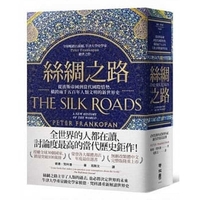Take a photo of a barcode or cover
informative
fast-paced
informative
medium-paced
I found Silk Roads to be an engaging and digestible read.
Frankopan has a great ability to synthesize a truly vast topic into a compelling narrative. The arguments he makes were sometimes surprising to my mind (Britain's true rival in the years pre-WWI was Russia, the Mongols governed with a lighter touch than is assumed, the Knox Darcy oil concession in Persia was as significant an event as Columbus' arrival in the Americas), but they're all made with care and subtlety.
Frankopan has a great ability to synthesize a truly vast topic into a compelling narrative. The arguments he makes were sometimes surprising to my mind (Britain's true rival in the years pre-WWI was Russia, the Mongols governed with a lighter touch than is assumed, the Knox Darcy oil concession in Persia was as significant an event as Columbus' arrival in the Americas), but they're all made with care and subtlety.
adventurous
informative
reflective
medium-paced
A comprehensive world history hinging on the near and middle east. Attempts, I think very successfully, to reframe world history away from the mountain of biases, propaganda, and prejudice that have accumulated in the western understanding. Challenges western supremacism and the renaissance rhetoric of western cultural inheritance.
A novel framing, thoroughly researched, and grippingly told. Frankopan has completely shifted my understanding of world history and in the process fleshed out my image of many historical places and peoples.
Brilliantly written, informative, and engaging.
A novel framing, thoroughly researched, and grippingly told. Frankopan has completely shifted my understanding of world history and in the process fleshed out my image of many historical places and peoples.
Brilliantly written, informative, and engaging.
medium-paced
challenging
informative
medium-paced
read this for my history class earlier this year. was solid but it did get kinda boring in the middle part
informative
slow-paced
informative
reflective
fast-paced
The first half was going so well- it centered on Central Asia and was actually teaching me new things, while also bringing in European actions that are well known in the United States curriculum, at least. However, when the European Age of Exploration began in the book, we were no longer taking a close look at Central Asia and slowly stopped hearing what these various nations did or felt in response to the sudden expansion of European powers. It was annoying, but it made sense because this age did cause a complete change to global trade even though I already knew all this. Then, the events leading up to and surrounding WWI began. Nothing was new to me. Everything was about English and Russian bickering and backstabbing each other and everyone around them. What did India feel about what the English thought was a threat to their control of the subcontinent? What were Persian officials saying about this bickering going on in their eastern front? I don’t know; it was never shared. I stopped once it became clear that the rest of the book, while looking at events in Central Asia more closely than events in Europe, the Americas, Eastern Asia, or Africa, would just follow a European power POV. EXTREMELY disappointing.
Another major disappointment is that the book is called “The Silk Roads” and while it is a history of the world, for the first half of the book told history through the lens of trade. The entire chapters “The Road to Crisis” and “The Road to War” just focus on the bickering I mentioned above. The next chapter touts that it will be a history of the start of oil trade, as it’s called “The Road of Black Gold” but surprise! It’s more British paranoia with the start of the oil trade glazed over in a meager 29 page chapter with a half page dedicated to a map (the war chapters took up 40). If this book focused on the history of the world through trade in Central Asia to the rest of the Eurasia/ Africa landmass- that started before the Silk Road- it would actually be a book ‘that makes you question your assumptions about the world’ as the Wall Street Journal claimed.
Another major disappointment is that the book is called “The Silk Roads” and while it is a history of the world, for the first half of the book told history through the lens of trade. The entire chapters “The Road to Crisis” and “The Road to War” just focus on the bickering I mentioned above. The next chapter touts that it will be a history of the start of oil trade, as it’s called “The Road of Black Gold” but surprise! It’s more British paranoia with the start of the oil trade glazed over in a meager 29 page chapter with a half page dedicated to a map (the war chapters took up 40). If this book focused on the history of the world through trade in Central Asia to the rest of the Eurasia/ Africa landmass- that started before the Silk Road- it would actually be a book ‘that makes you question your assumptions about the world’ as the Wall Street Journal claimed.


